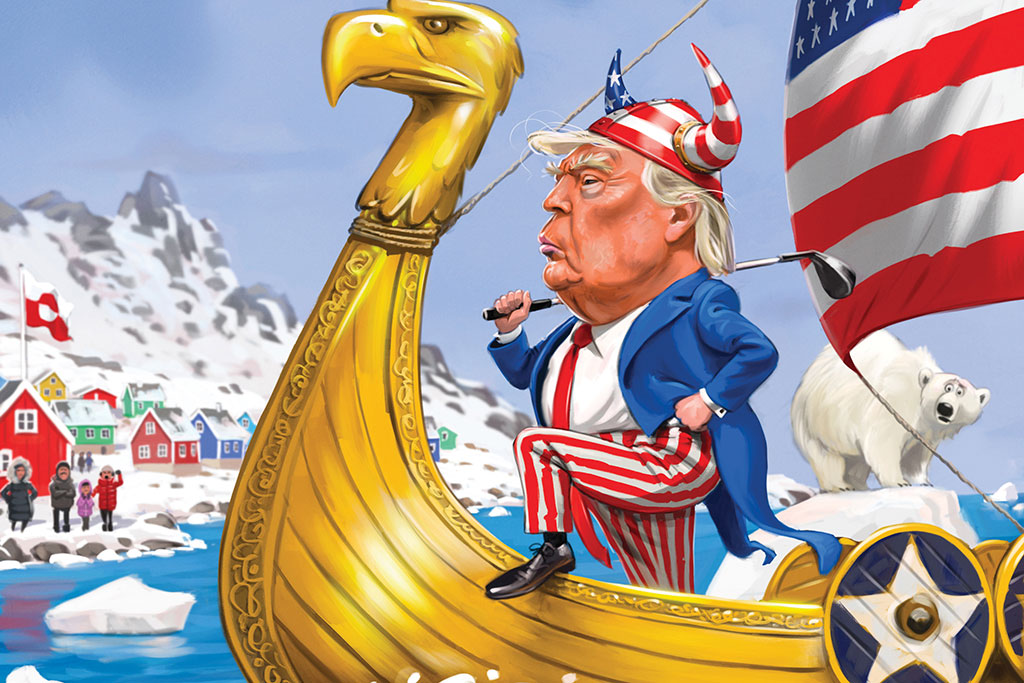Want to quit your job and live an egalitarian life off the land? Things aren't quite that simple
The idea of adopting a simpler lifestyle free from social hierarchies, economic inequalities and tiresome modern work appeals to many romantics – but there are some practical considerations, says Stuart Watkins


Get the latest financial news, insights and expert analysis from our award-winning MoneyWeek team, to help you understand what really matters when it comes to your finances.
You are now subscribed
Your newsletter sign-up was successful
Want to add more newsletters?

Twice daily
MoneyWeek
Get the latest financial news, insights and expert analysis from our award-winning MoneyWeek team, to help you understand what really matters when it comes to your finances.

Four times a week
Look After My Bills
Sign up to our free money-saving newsletter, filled with the latest news and expert advice to help you find the best tips and deals for managing your bills. Start saving today!
The left’s present-day obsession with social and economic inequalities was invented in 2011 by David Graeber, an anthropologist and anarchist activist who died towards the end of last year. In the wake of the credit crunch and financial crisis, a small advertisement appeared in the Vancouver-based magazine Adbusters, as Daniel Immerwahr relates in The Nation. “What is our one demand?” it asked.
The question wasn’t answered. Readers were only told “#OccupyWallStreet. September 17th. Bring tent”. The result was – as surely no one expected, not even the organisers – a global movement that briefly shook the world. The movement “held Zuccotti Park in Lower Manhattan for two months, made headlines, and set off more than 200 occupations globally”, says Immerwahr. The question in the original advertisement was in fact never answered, but the movement did settle on a slogan, one that has since entered the vocabulary: “We are the 99%”. The insight was based on the latest economic research, which showed a growing gap between the top 1% and everyone else. The slogan that grabbed the popular imagination was Graeber’s.
That story, like all origin stories, is something of a simplification and a myth, of course. Social and economic inequalities in a broad sense have been a concern of the left for centuries. Graeber didn’t invent the slogan, but contributed ideas to the committee that did. Nevertheless, stories like that do something to capture the spirit of the moment and reveal basic truths in easily digestible form. It’s hard to imagine that the discrepancy between the fine-grained detail of the historic facts and the story that comes to be widely believed is all that important for most purposes.
MoneyWeek
Subscribe to MoneyWeek today and get your first six magazine issues absolutely FREE

Sign up to Money Morning
Don't miss the latest investment and personal finances news, market analysis, plus money-saving tips with our free twice-daily newsletter
Don't miss the latest investment and personal finances news, market analysis, plus money-saving tips with our free twice-daily newsletter
So you might think, but Graeber’s career was dedicated to showing that that assumption is false. A rough template for everything he wrote looks something like this: “Such-and-such a phenomenon is widely believed to be explained by such-and-such a story. But there’s not a shred of evidence that this is true. In fact, the story is more like this [insert better story here]. The discrepancy between the story and the facts goes some way to explaining much of contemporary concern to socialists and anti-capitalists”.
In his widely acclaimed Debt: The First 5,000 Years (Melville House, 2011), for example, he says the story that trade using money evolved from barter, and that all societies regard it as a moral obligation that one must pay back one’s debts, was not based in history or the ethnographic record, but was a myth created by economists for their own nefarious purposes to justify an oppressive social system. We all came to believe the myth and hence got stuck in a system where creditors have too much power over debtors.
Once upon a time…
In Graeber’s posthumously published new book, The Dawn of Everything: A New History of Humanity (Allen Lane, 2021), written with archaeologist David Wengrow, the general theme continues. The story objected to this time concerns the origins of social and economic inequality. Once upon a time the whole of humanity lived in small, simple hunter-gatherer bands. This was, according to political preference, a time of egalitarian, even “communist” bliss, operating on the principle “from each according to ability, to each according to need”, where economic inequalities and social hierarchies and strife were unknown; alternatively, a time of hellish struggle for survival, operating on the principle of “each to his own, and the devil take the hindmost”, where life was nasty, brutish and short. Then along came agriculture. Again, according to preference, this was a terrible mistake, or a necessary step on the road to progress, but in either case the result thereafter was necessarily one of earning a living through the toil and the sweat of your brow, of private property and hence of state power, and a social division of labour resulting in class stratification and social inequality.
The views sketched here can be traced back to Enlightenment philosophers Jean-Jacques Rousseau and Thomas Hobbes respectively, and versions of the same story are regularly retold today, even if now garlanded with more modern scientific accoutrements – see Jared Diamond, Steven Pinker, Yuval Noah Harari and Francis Fukuyama, for example. The trouble with this picture, according to Graeber? You’ve guessed it: there’s “not a shred of evidence” that any of it ever actually happened. Indeed, as Graeber and Wengrow point out, it would be pretty extraordinary if there were.
The stories presented by Rousseau and Hobbes (and, in the case of debt and barter, Adam Smith) were essentially thought experiments, “as if” imaginary stories presented to make a philosophical point. It would be one heck of a coincidence if the thought experiments of these dead philosophers turned out accurately to represent what had actually happened over the millennia of human history and pre-history. And indeed, what we might expect – that the reality as revealed by modern developments in archaeology, history and anthropology is somewhat more interesting and complicated than these short “as if” stories can capture – is confirmed by a study of the relevant fields. Graeber and Wengrow’s 700-page book is a compelling and fascinating, if sometimes wearying, overview of the literature.
The bigger picture
But as in the case of Debt, it would be fair to say that the book is not all it at first appears to be – it is not intended to be of merely academic interest, nor for popular entertainment, but something more like a political intervention, a manifesto, a contribution to an ongoing (and old) political debate. That broader debate concerns the nature of capitalism, especially from the point of view of those who see it as an intolerable system of exploitation and oppression, and desire its overthrow and replacement with something nicer.
Within this broader debate, it is generally conceded by all parties, and confirmed in broad outline by Graeber and Wengrow, that humans for most of their history did indeed live as hunter-gatherers, or at least in some kind of similar tribal arrangement, and that humans who live like that today can sometimes (to put it no more strongly) surprise us with their radical social arrangements – ones that seem to us shockingly egalitarian, with high levels of individual autonomy and happiness, and a remarkable freedom from toil, strife and conflict, at least internally. It seems reasonable to assume that this was broadly the case across the globe “until yesterday” in historical terms, to quote from the title of a popular book on the subject by Jared Diamond. The radical left (and Diamond) sees this as inspiring and want to draw political lessons – if we lived like that until yesterday, then why not today too?
The common argument against that proposition concerns complexity. In simple societies where people make their living by hunting and gathering whatever is to be found nearby, social relations can take a relatively relaxed and egalitarian form. But as soon as we start to create our own livelihood through agriculture, and later other forms of work, then private property and social hierarchies naturally arise, leading to inequalities of wealth and power, but also to general material progress and freedom from nature-imposed harshness and austerities.
Graeber and Wengrow have objections to raise at almost every step of these arguments. History does not proceed in such neat stages – the cultivation of crops is not in fact an unknown mystery to many groups that have been characterised as “hunter-gatherer”, for example, they just don’t allow it to structure the whole of life, or not all of the time anyway. (Fans of popular anthropology may remember that the pygmies in Colin Turnbull’s classic The Forest People did sometimes work in villages for agricultural concerns, but far from seeing this as the pinnacle of human achievement and prosperity, fled at the first opportunity to go and drink and dance and feast in the forest.) Societies classified by anthropologists as “hunter-gatherer” do not always live according to the ideals of anarchist-communists – oppressive hierarchies, even empires and slavery, are far from unknown. And, most importantly for the broader political debate in which Graeber and Wengrow’s book is an intervention, hunter-gatherer societies are anything but necessarily “simple” or small-scale.
That they are not simple in terms of social relationships, religious beliefs and rituals, art and culture, and so on, has long been understood by sympathetic anthropologists. Indeed, the insight defines the field. What is less widely understood is that they are not simple in terms of scale or economic achievements either. In earlier centuries, write Graeber and Wengrow, forms of regional hunter-gatherer organisation might extend over thousands of miles. Aboriginal Australians, for instance, could travel half way across the continent, moving among people who spoke different languages, and still find camps divided into familiar totemic moieties that determined who owed them hospitality, who had to be treated as “brothers” or “sisters”, who could be seen as potential marriage partners, and so on.
In modern-day Louisiana, at Poverty Point, you can still see the remains of massive earthworks erected by Native Americans in around 1600BC. Archaeologists believe the structures once formed a monumental precinct that extended over 200 hectares, about as big as the first Eurasian cities. It is a myth, too, that hunter-gatherers merely took the land as they found it. What to a colonialist settler’s eye might have appeared to be savage, untouched wilderness usually turned out to have been actively managed by indigenous populations for thousands of years. Archeologists working on mega-sites dating from roughly 4100BC to 3300BC in Ukraine believe that complex economies, involving gardening, the keeping of livestock, the cultivation of orchards, as well as hunting and foraging and the farming of some crops, as well as the building of essentially city-like structures, were coordinated on a mass scale, probably on some kind of egalitarian basis, or at least without centralised, rule-giving hierarchies.
Graeber and Wengrow’s political point is that human beings in the past did not act and choose on the basis of modern theories of material and geographic determinism, but were radically free to come up with every imaginable kind of social, political and economic arrangement, and indeed did do that – creating more than a few that we find hard to imagine to boot. What puzzles them is why we do not do that today, but instead seem everywhere “stuck” in the same old boring capitalist arrangements.
They do not answer this question, but raise it in order to suggest that we too might throw off the shackles of oppression and create something new and more fun instead. (To the uninitiated, there is no more damning criticism in anarchists’ eyes than that something is deemed “boring”, or places constraints on the freedom of individuals to run off and do something they prefer instead. It is a theory to justify eternal adolescence.)
The most important objection to this, though, remains what it has always been. Graeber and Wengrow trip over the truth in the early pages of their book, but then pick themselves up and hurry on as if nothing had happened.
Boring economic realities
The economist ARJ Turgot, writing in 1751 in response to arguments such as those we have rehearsed here – namely, that it would be wonderful if we could all live like what were then known as “savages” – responded that we must consider the larger context, as Graeber and Wengrow relate. “We all love the idea of freedom and equality in principle,” Turgot wrote, but as societies evolve, technologies advance. Natural differences in talents and capacities between individuals become more significant and they form the basis for an ever-more complex division of labour. The result is eventually a commercial civilisation with an advanced and highly complex division of labour that necessarily results in relative riches for some and poverty and dispossession for others. However lamentable this may be, it is the necessary condition for the prosperity of society as a whole. (Today we might add that the prosperity of society as a whole provides a sound basis for tackling those problems that Turgot could only lament, but that material progress is increasingly relegating to history.)
As we have seen, it is the main purpose of Graeber and Wengrow’s book to chip away as best they can at these arguments. But no matter how the details of the historical picture may change, and how problematic we make the idea of “social evolution”, the basic point doesn’t. And this is that, however it is we got here, industrial society now supports the lives of billions of human beings, and it’s far from obvious that there is any other way of doing that than with the means at hand – a complex industrial society based on private property and the rule of law, which at the least necessitates some kind of minimal state; prices and profits; free markets and competition. Finding our place in this broader system may be boring for anarchists, but it puts the dinner on the table.
Consider the pencil
Graeber and Wengrow think they have disposed of the argument by showing that hunter-gatherer and other early, and arguably freer, societies were more complex than we thought. But it’s far from clear that they were truly complex in the sense that matters for the sake of the broader political argument.
It’s easy enough to imagine how an early society of humans might organise something on egalitarian lines that resembles a city, how a relatively complex economy might evolve, how labour might be divided consciously by agreement, and so on – even if it was no doubt much harder to achieve in reality than it is to imagine. But modern industrial societies are far more complex even than that.
As we will know if we have read economist Leonard Read’s famous essay I, Pencil, even the making of a humble pencil is beyond the abilities of the smartest and most creative committee of anarchists. It takes a whole society, organised globally in ways that are the result of human action, but not of human design. No one person, nor committee of them, has any idea how to make a pencil, let alone an aeroplane – the necessary knowledge is widely dispersed among millions of people. And yet, given a complex interaction of markets and other social institutions, such things nevertheless do get made every day.
This stretches the human imagination more than the building of a primitive city, no matter how much the latter may appeal to romantics, and leaves us in a somewhat humbler position. As Hayek put it: “The curious task of economics is to demonstrate to men how little they really know about what they imagine they can design.”
Graeber and Wengrow have succeeded in showing that the historic design process, if we care to think of it like that, must have been hugely more complicated than our old myths could imagine. But they have not succeeded in their broader political task of convincing us that we could throw it all off and start again – at least, not without courting social and economic catastrophe. In short, we should think twice before throwing off our responsibilities and running back to the forest – not least because, if we all did that, there would be no forest left at all.
Get the latest financial news, insights and expert analysis from our award-winning MoneyWeek team, to help you understand what really matters when it comes to your finances.

Stuart graduated from the University of Leeds with an honours degree in biochemistry and molecular biology, and from Bath Spa University College with a postgraduate diploma in creative writing.
He started his career in journalism working on newspapers and magazines for the medical profession before joining MoneyWeek shortly after its first issue appeared in November 2000. He has worked for the magazine ever since, and is now the comment editor.
He has long had an interest in political economy and philosophy and writes occasional think pieces on this theme for the magazine, as well as a weekly round up of the best blogs in finance.
His work has appeared in The Lancet and The Idler and in numerous other small-press and online publications.
-
 Average UK house price reaches £300,000 for first time, Halifax says
Average UK house price reaches £300,000 for first time, Halifax saysWhile the average house price has topped £300k, regional disparities still remain, Halifax finds.
-
 Barings Emerging Europe trust bounces back from Russia woes
Barings Emerging Europe trust bounces back from Russia woesBarings Emerging Europe trust has added the Middle East and Africa to its mandate, delivering a strong recovery, says Max King
-
 How a dovish Federal Reserve could affect you
How a dovish Federal Reserve could affect youTrump’s pick for the US Federal Reserve is not so much of a yes-man as his rival, but interest rates will still come down quickly, says Cris Sholto Heaton
-
 New Federal Reserve chair Kevin Warsh has his work cut out
New Federal Reserve chair Kevin Warsh has his work cut outOpinion Kevin Warsh must make it clear that he, not Trump, is in charge at the Fed. If he doesn't, the US dollar and Treasury bills sell-off will start all over again
-
 How Canada's Mark Carney is taking on Donald Trump
How Canada's Mark Carney is taking on Donald TrumpCanada has been in Donald Trump’s crosshairs ever since he took power and, under PM Mark Carney, is seeking strategies to cope and thrive. How’s he doing?
-
 Rachel Reeves is rediscovering the Laffer curve
Rachel Reeves is rediscovering the Laffer curveOpinion If you keep raising taxes, at some point, you start to bring in less revenue. Rachel Reeves has shown the way, says Matthew Lynn
-
 The enshittification of the internet and what it means for us
The enshittification of the internet and what it means for usWhy do transformative digital technologies start out as useful tools but then gradually get worse and worse? There is a reason for it – but is there a way out?
-
 What turns a stock market crash into a financial crisis?
What turns a stock market crash into a financial crisis?Opinion Professor Linda Yueh's popular book on major stock market crashes misses key lessons, says Max King
-
 ISA reforms will destroy the last relic of the Thatcher era
ISA reforms will destroy the last relic of the Thatcher eraOpinion With the ISA under attack, the Labour government has now started to destroy the last relic of the Thatcher era, returning the economy to the dysfunctional 1970s
-
 Why does Trump want Greenland?
Why does Trump want Greenland?The US wants to annex Greenland as it increasingly sees the world in terms of 19th-century Great Power politics and wants to secure crucial national interests